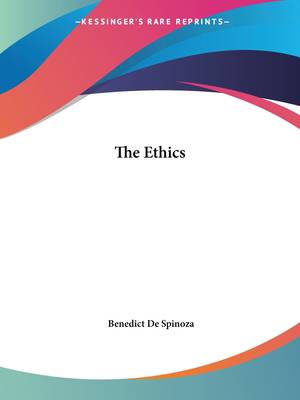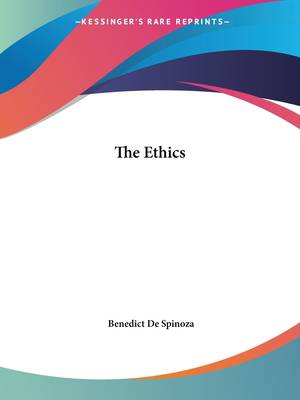
En raison d'une grêve chez bpost, votre commande pourrait être retardée. Vous avez besoin d’un livre rapidement ? Nos magasins vous accueillent à bras ouverts !
- Retrait gratuit dans votre magasin Club
- 7.000.000 titres dans notre catalogue
- Payer en toute sécurité
- Toujours un magasin près de chez vous
En raison de la grêve chez bpost, votre commande pourrait être retardée. Vous avez besoin d’un livre rapidement ? Nos magasins vous accueillent à bras ouverts !
- Retrait gratuit dans votre magasin Club
- 7.000.0000 titres dans notre catalogue
- Payer en toute sécurité
- Toujours un magasin près de chez vous
Description
The Ethics is a philosophical treatise written by Benedict de Spinoza. Published in 1677, it is considered one of the most influential works of Western philosophy. The book is divided into five parts, which cover a range of topics including God, the mind, the emotions, and human nature. Spinoza's central thesis is that everything in the universe is a manifestation of God, and that the highest form of human happiness comes from understanding this unity. He argues that the mind and the body are not separate entities, but rather two aspects of the same thing. The Ethics is written in a geometric style, which means that Spinoza uses definitions, axioms, and propositions to build his arguments. The book is known for its clear and concise writing, as well as its rigorous logical structure. It has been praised for its insights into human nature and its influence on subsequent philosophers, including Immanuel Kant and Friedrich Nietzsche.II. A thing is called FINITE AFTER ITS KIND, when it can be limited by another thing of the same nature; for instance, a body is called finite because we always conceive another greater body. So, also, a thought is limited by another thought, but a body is not limited by thought, nor a thought by body.This scarce antiquarian book is a facsimile reprint of the old original and may contain some imperfections such as library marks and notations. Because we believe this work is culturally important, we have made it available as part of our commitment for protecting, preserving, and promoting the world's literature in affordable, high quality, modern editions, that are true to their original work.
Spécifications
Parties prenantes
- Auteur(s) :
- Editeur:
Contenu
- Nombre de pages :
- 48
- Langue:
- Anglais
Caractéristiques
- EAN:
- 9781419161339
- Date de parution :
- 17-06-04
- Format:
- Livre broché
- Format numérique:
- Trade paperback (VS)
- Dimensions :
- 211 mm x 277 mm
- Poids :
- 213 g

Les avis
Nous publions uniquement les avis qui respectent les conditions requises. Consultez nos conditions pour les avis.






